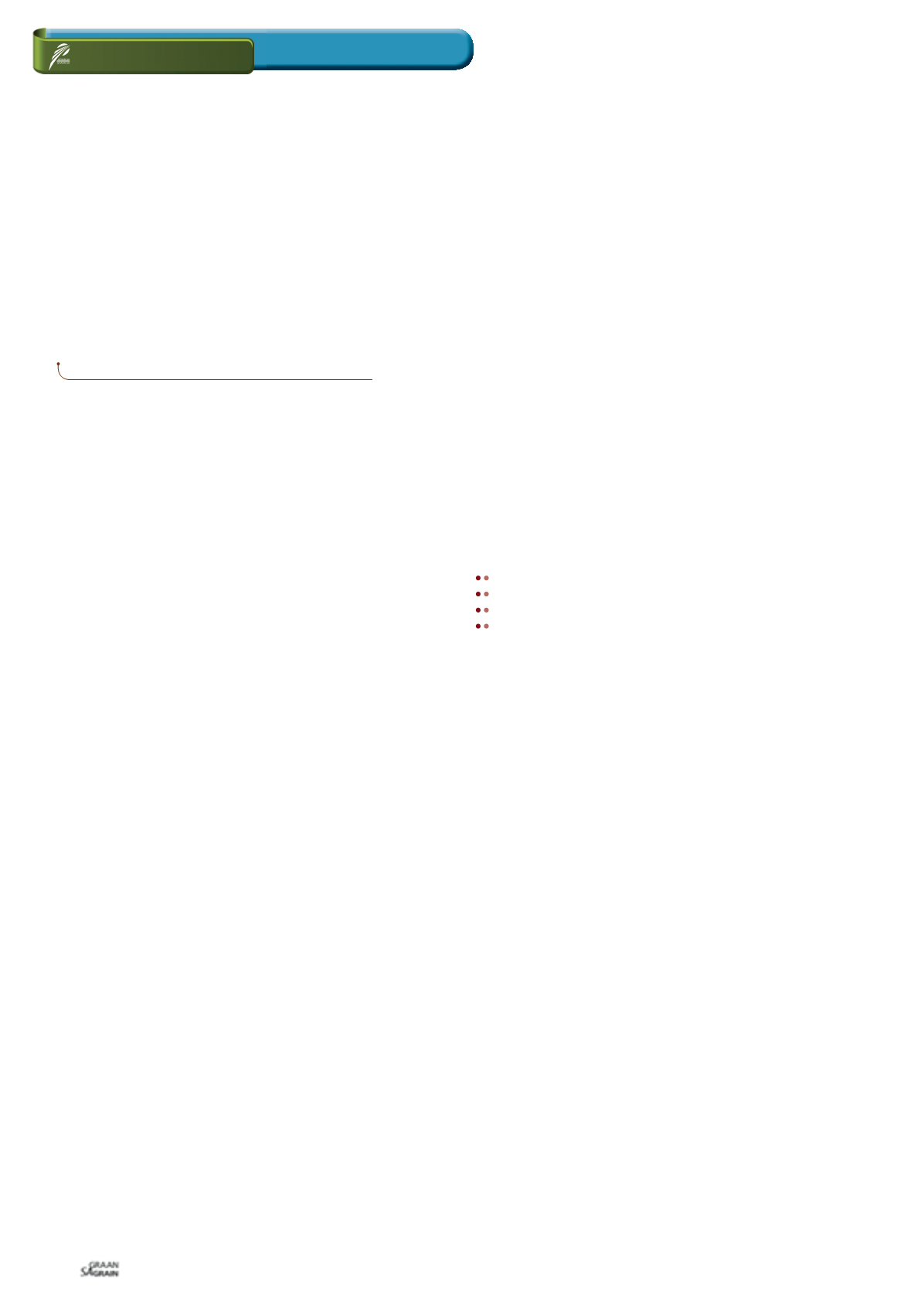

Junie 2017
74
Chasing wheat yields in
challenging environments
W
ith the increase in food prices over the last two decades,
more frequent food riots and related deaths in countries
that cannot meet local food demand, have become a
global tendency.
Wheat remains one of the most important food crops after maize
and rice in the world. The world wheat yield gain is currently stag-
nant at 1% per annum, while it needs to be in the region of 1,7% to
2% to meet the requirements of the growing population.
With the latest prediction models, depending on which trend is fol-
lowed, the world population will reach between 10,5 and 16 billion
by the year 2100. The new 2050 prediction is that the world will need
65% more food than what is currently produced.
This situation is far worse on the African continent, as 80% to 90%
of the global population growth is expected to come from Africa.
At the current agricultural productivity, it is predicted that Africa
will only be able to meet 15% of its food demands in 2050.
A general consensus amongst agricultural researchers around the
world is that the current global financial balance sheet for Research
and Development (R&D) funding into agriculture is completely out
of balance and an area of major concern for the future.
With this depicted growing demand for food by the world popula-
tion, there is a drastic need for more R&D investment into global
agriculture. So, the question remains: Can we alter the expected
path of these prediction models with a global dedicated wheat yield
improvement research agenda?
What we learnt: Challenges of climate
change to wheat production
Research findings show that wheat yields drop with every increase
in average night temperature, suggesting an even tougher battle
for breeders ahead. Wheat is not responding favourably to the aver-
age increase in CO
2
levels.
The potential area for expansion to wheat production around the
world is very limited. It is believed that the largest potential to in-
crease global wheat production lies within emerging farmers of the
developing countries of Asia and Africa. Research to improve the
genetic yield potential of wheat is required to make the economics
more favourable for the producers.
About IWYP
The International Wheat Yield Partnership (IWYP) was formed
towards the end of 2014/2015. IWYP is a sub-initiated, but inde-
pendent research programme of the International Wheat Initiative.
Dr Jeff Gwyn (director: IWYP) and Dr Mark Sawkins (deputy direc-
tor and research portfolio co-ordinator) based in Texas in the USA,
in combination with their specialised research advisory committee,
have been tasked with the difficult job to select needed research
focuses for funded and aligned projects around the world.
Ultimately Drs Gwyn and Sawkins were appointed to manage and
advise international funding bodies committed to the IWYP course
to channel funds in the directions which is believed to give the
needed scientific breakthroughs to achieve a significant jump in the
genetic yield potential of wheat. IWYP members, its directors and
scientific advisory board, promise to do things differently.
They aim to:
Take a high risk/high reward approach.
Take advantages of opportunities and technologies.
Fund, align and partner-up.
Ultimately focus on research outputs that can be applied directly
on the farm for the wheat producers.
IWYP recently (20 - 23 March 2017) had its second Annual Scien-
tific programme meeting in Obregon, Mexico where 60 wheat re-
searchers around the world interactively met to discuss their latest
research findings and the best collective way forward.
The ambitious mission of IWYP is to increase the global wheat
yield averages by 50% by 2030.
Ms Bongiwe Nhlapho and I, both from ARC-Small Grain, had the
opportunity to attend this second Annual IWYP meeting in Mexico,
predominantly as a result of the funding received from the WCT ca-
pacity building initiative.
IWYP has the sole scope of improving the genetic yield potential
of wheat through a series of high-risk/high reward research pro-
jects funded or co-funded by 13 international research and funding
agencies.
Currently there are also nine private partners. The total value of
the first eight IWYP funded research projects from the first call
in 2015/2016 was around US $20 million. The funded and aligned
projects involve various institutions and research teams in the
United Kingdom, Australia, United States, Mexico, India, Argentina,
Spain and now also South Africa.
In May 2016 Dr Annelie Barnard and I contacted Drs Gwyn and
Sawkins directly via a telephone conference with the intention
to become a member of the IWYP community. We proposed a
new project with the aim to increase wheat yields in challenging
environments.
This project was evaluated by an expert team of researchers and
now, almost twelve months later, South Africa is proudly repre-
sented and a contributing IWYP member through the aligned pro-
jects channel. This aligned project is the first representation of any
South African or African research institute on the IWYP programme.
RELEVANT
– ARC a proud member of IWYP
DR SCOTT SYDENHAM,
ARC-Small Grain, Bethlehem

















